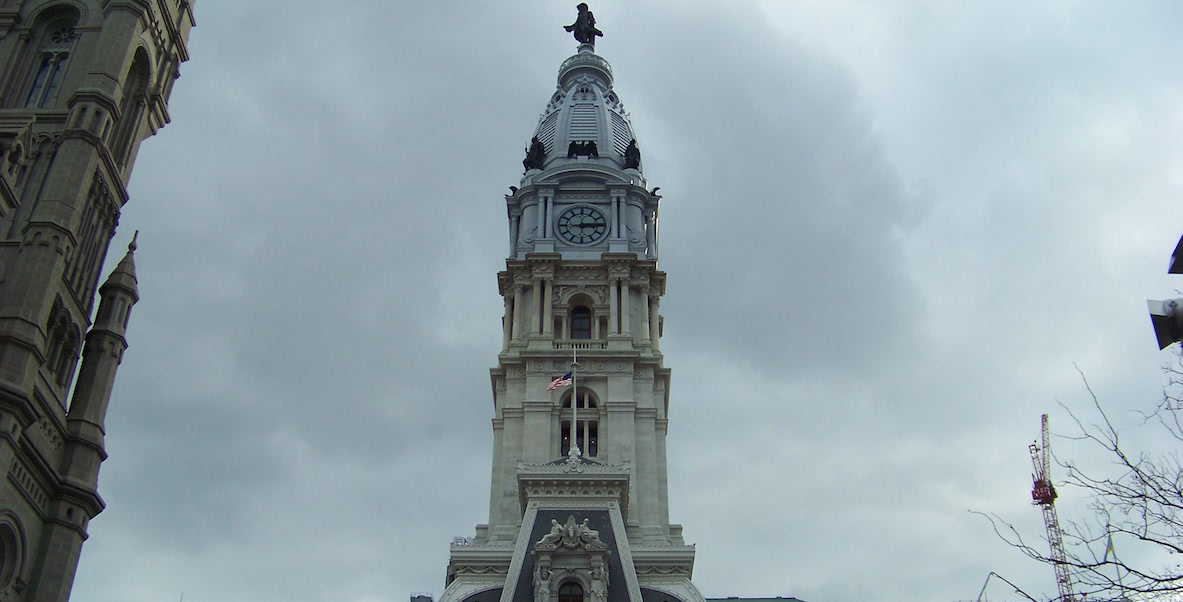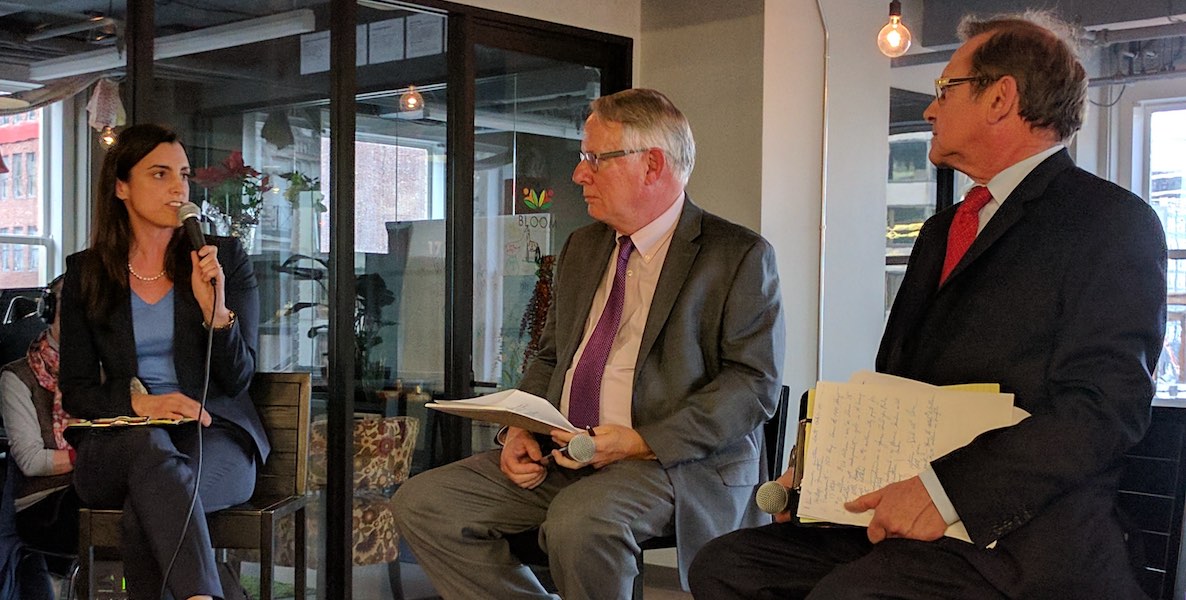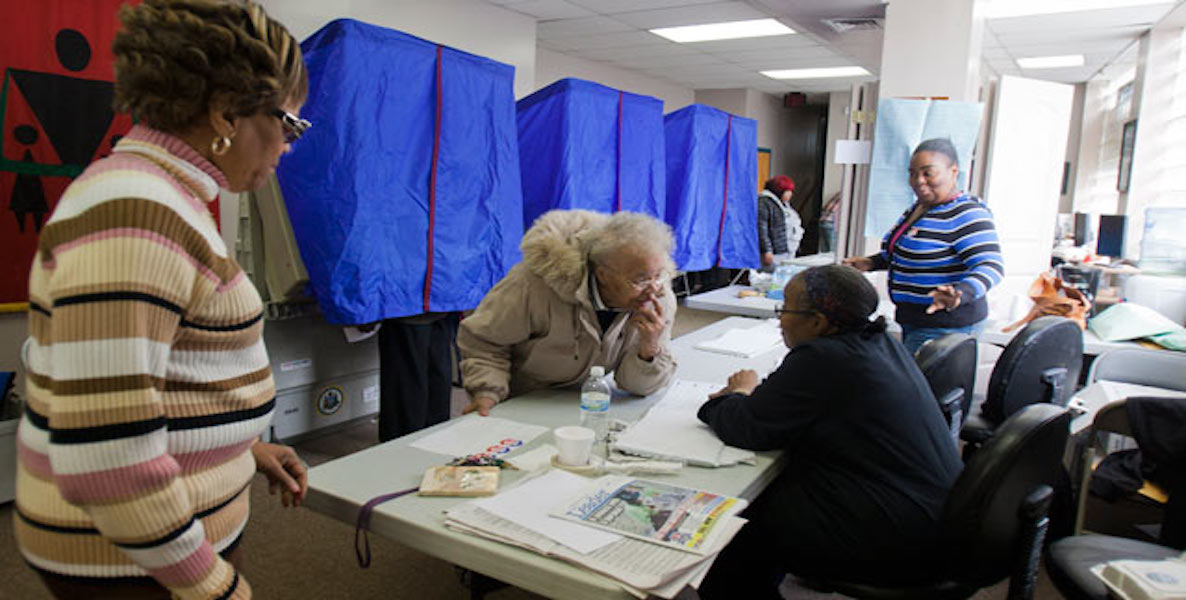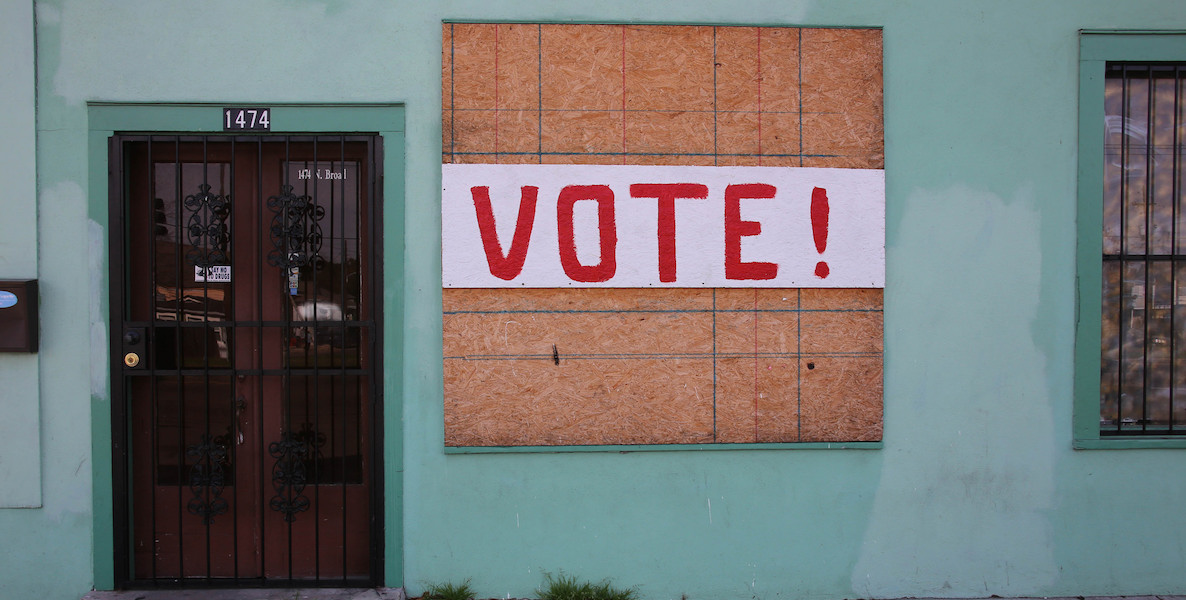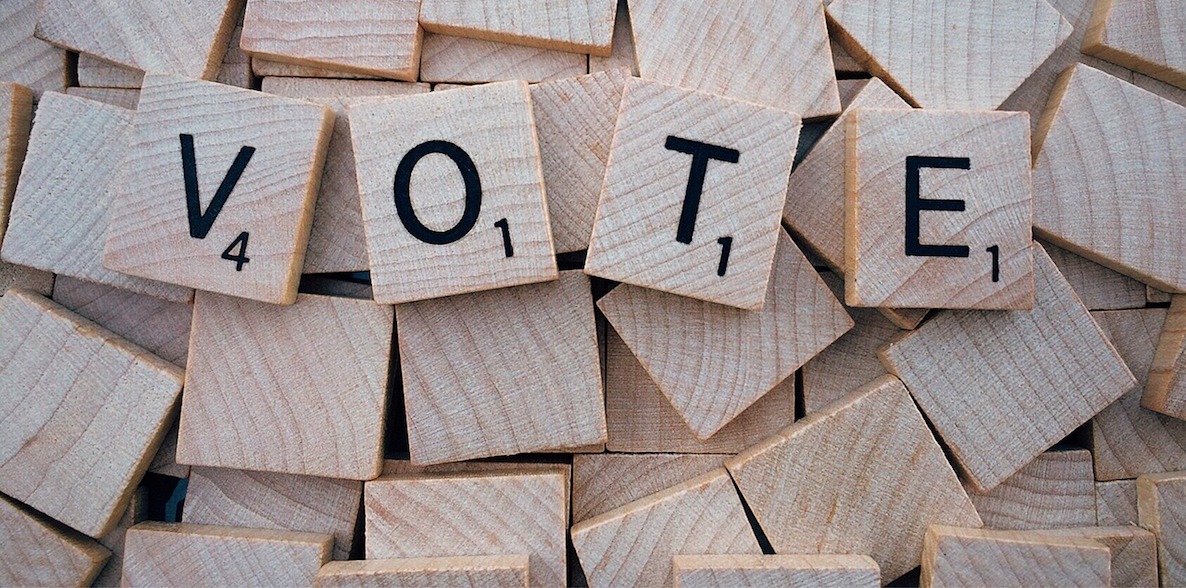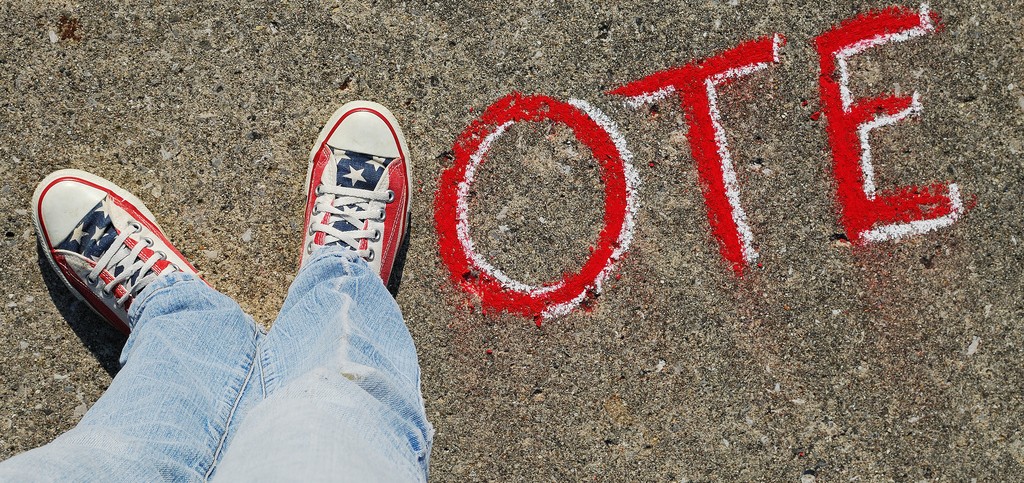November 7, 2017 is a general election, meaning Philadelphia voters of any party affiliation, as well as those registered as Independent, may vote for any candidate on the ballot. There are also two new ballot measures for consideration: a proposed change to the PA Constitution, and a local question requesting permission to borrow funds for capital expenditures. (If you’re not sure about your registration status, check here.)
Didn’t I Just Vote For These Offices?
If you’re part of the 18 percent of Philadelphia’s electorate that exercised its right to vote in the spring primaries, yes. In that election, registered Democrats and Republicans voted among their own. The winners from that contest have moved on to be candidates in this general election.
When are the polls open?
Polls are open from 7am to 8pm. Remember that you can get in line to vote before 7am, and you can vote as long as you were in line before 8pm, even if you don’t get into the actual voting booth until later. Also remember: Polling places change, so make sure you know where to go by checking with the state.
Why should I vote in this election?
The reasons from our spring voter guide still hold true. Same important offices; same tragically low turnout. Here’s the number one reason to come out again for the General Election:
Anything is possible, especially in 2017.
This year’s primary brought a lot of surprises. The incumbent City Controller lost to a first-time reformer. A slate of former prosecutors lost the Democratic nomination to a prominent civil rights attorney with no prosecutorial experience. Voter turnout hit 18 percent, an abysmally low number that Create a sample ballotDo Something
… But that was the primary. This is the general. The campaigns have dialed back after the blistering pace of the spring, with fewer signs, ads and debates to keep the issues in the forefront of the public consciousness. Those who came out for winners in May may feel like the hard part is done, and they can safely sit this one out. Meanwhile, Independents and third party voters are in play this time. Along with Republicans, they collectively add up to one-third of all registered Democrats. However, Democrats were split in the spring primary, particularly across the crowded District Attorney field. With big implications for policing, public safety, and social justice, that race may have voters crossing party lines to vote their ideology. Sound familiar?
Is it likely that this election will send the Democratic primary nominees into office? If the history of the past 60 years is any guide, yes, that is the most likely scenario. But as we learned in 2016, it only takes a small majority of voters to catch everyone else sleeping.
What’s with all these judicial candidates?
Pennsylvania is one of eight states that elect judges through partisan elections at all trial court levels. If you don’t recognize a single name in these races, or you feel a little unqualified to determine their ability to serve as an impartial judge, you’re in good company. We recommend deferring to the recommendations of the Pennsylvania and Philadelphia Bar Associations. Both organizations have way more expertise in this field than the average voter, and they conduct substantive reviews of every candidate. We’ve listed their recommendation next to each judicial candidate.
Ok, got it. What about these crazy “Retention Votes?”
Right. Much like the Federal Government, many states use a method of judicial appointment called “assisted appointment” (aka “merit selection”) in which the governor appoints judges with approval from the legislature. The argument here is that judges should not be incentivized to act as politicians, but as impartial officials selected on merit. Because these appointments can often be for life, retention votes were instituted to give the public some feeling of control. At regular intervals, the public can vote up or down to retain each appointee for another term, usually with a simple majority.
Pennsylvania, as you may have guessed, is different. We’re one of only seven states to run partisan elections for every level of the judiciary. This despite evidence that partisan judicial elections invite much higher campaign contributions, which have in turn been shown to influence decisions on the bench. Then, because one of of seven just isn’t special enough, we’re one of just two states to tack on a retention vote. Because why not?
All caught up? Nifty. Here’s what you’ll see on your ballot and what it means:
District Attorney
This race won’t actually be at the top of your ballot (it will be buried beneath the local and statewide judicial races mentioned above), but it should be top of mind. As chief prosecutor for the City, the District Attorney determines what crimes will be prosecuted, and the severity of the charges. You may ask, “Don’t judges have the final say in sentencing?” Sure, if the case goes to trial. But the vast majority of cases are actually decided by plea bargain, meaning the DA’s office has an incredible amount of power and discretion.
Debates have been a bit more scarce, but you can get a good grasp of the candidates in this recording of an October 24, 2017 debate hosted by Center City Residents Association.
Democratic candidate: Larry Krasner emerged the winner from a seven-candidate field in the May primary.
Republican candidate: Beth Grossman ran unopposed in the spring election.
City Controller
The City Controller is the top fiscal watchdog of the city, auditing expenditures of the city government. This race tends to take a back seat to the more high-profile District Attorney contest, but it’s incredibly important.
Democratic candidate: Rebecca Rhynhart upset incumbent Dem Alan Butkovitz in the primary.
Republican candidate: Michael Tomlinson ran unopposed earlier this year.
Justice of the Supreme Court
This statewide race is for a seat in Pennsylvania’s top court, which handles appeals and disputes from the lower courts. Both candidates ran unopposed in the May primary, and now face each other for a single seat. Voters can vote for one candidate.
Dwayne Woodruff is the Democratic candidate. He is “Recommended” by the PA Bar Association.
Sallie Updyke Mundy is the Republican candidate. She is “Highly Recommended” by PA Bar Association.
Judge of the Superior Court
The PA Superior Court is a statewide entity that handles appeals from the Court of Common Pleas in criminal cases and in matters involving children and families. It usually hands down the final decision in these matters.
Statewide (Vote for up to 4)
Carolyn H Nichols (Democrat) – “Recommended” by PA Bar Association
Geoff Moulton (Democrat) – “Highly Recommended” by PA Bar Association
Maria Mclaughlin (Democrat) – “Recommended” by PA Bar Association
Debbie Kunselman (Democrat) – “Highly Recommended” by PA Bar Association
Emil Giordano (Republican) – “Highly Recommended” by PA Bar Association
Wade A Kagarise (Republican) – “Recommended” by PA Bar Association
Mary Murray (Republican) – Not assessed by PA or Philadelphia Bar Association
Paula A Patrick (Republican) – “Highly Recommended” by PA Bar Association
Jules Mermelstein (Green) – “Not Recommended” by PA Bar Association (failure to participate)
Judge of the Commonwealth Court
This intermediate court is unique to Pennsylvania. It is responsible for cases involving government agencies and regulatory bodies, as well as any lawsuits filed by or against the Commonwealth. It’s these judges who decide the fate of state laws, which is important in the next four years, as Pres. Trump sends issues of health, education, women’s rights and the environment to the states.
Statewide (Vote for up to 2)
Ellen Ceisler (Democrat) – “Recommended” by PA Bar Association
Irene M Clark (Democrat) – “NOT Recommended” by PA Bar Association
Paul Lalley (Republican) – “Recommended” by PA Bar Association
Christine Fizzano Cannon (Republican) – “Highly Recommended” by PA Bar Association
Judge of the Court Of Common Pleas
This is PA’s court of general trial jurisdiction. Philadelphia’s 90 Common Pleas Court judges are divided into trial, family, and orphans’ divisions.
Citywide (Vote for up to 9)
Stella Tsai (Democrat) – ”Recommended” by the Philadelphia Bar Association
Vikki Kristiansson (Democrat) – ”Recommended” by the Philadelphia Bar Association
Deborah Cianfrani (Democrat) – ”NOT Recommended” by the Philadelphia Bar Association
Shanese Johnson (Democrat) – ”NOT Recommended” by the Philadelphia Bar Association
Mark B Cohen (Democrat) – ”NOT Recommended” by the Philadelphia Bar Association
Deborah Canty (Democrat) – ”Recommended” by the Philadelphia Bar Association
Zac Shaffer (Democrat) – ”Recommended” by the Philadelphia Bar Association
Lucretia C Clemons (Democrat) – ”Recommended” by the Philadelphia Bar Association
Vincent Furlong (Democrat) – ”Recommended” by the Philadelphia Bar Association
Vincent Furlong (Republican) – ”Recommended” by the Philadelphia Bar Association
(Note the appearance twice of Vincent Furlong, cross-listed as both a Republican and a Democrat in this election, a practice that is legal for judicial elections in Pennsylvania. Go figure.)
Judge of the Municipal Court
At this first level of PA’s judiciary, Philadelphia’s Municipal Court judges decide whether serious cases move to the Commonwealth Court, conduct preliminary hearings and arraignments, and set and accept bail in most cases.
Citywide (Vote for up to 2)
Matt Wolf (Democrat) – ”Recommended” by the Philadelphia Bar Association
Marissa Brumbach (Democrat) – ”Recommended” by the Philadelphia Bar Association
Judge of Election and Inspector of Election
These folks are your neighbors, and must live in your voting division (e.g. 2-06 means Ward 2, Division 6). Two inspectors in each division make sure the polling machines are up and running on time, and one judge of election ensures everything is setup in compliance with state and local laws.
Retention Votes
Much like first-time judicial candidates, few citizens are qualified or familiar enough with judges to evaluate their performance. We recommend deferring to the PA and Philadelphia Bar Associations.
The PA Bar Association recommends all three Supreme and Superior Court judges on the ballot for retention.
For Court of Common Pleas and Municipal Court judge retention votes, we recommend going a step further and reading the Philadelphia Bar Association poll results, which asked members to rate judges on a number of dimensions. The reviews are fascinating, and mostly positive, except when they aren’t.
Ballot Questions
Should we change the PA State Constitution? Should we let Philadelphia borrow millions of dollars for needed repairs? You decide on these statewide and local referendums.
While they do not endorse candidates, the Committee of Seventy does sometimes weigh in on matters of good governance. They don’t take a stance on either ballot question this time around, but you can read more about both questions here and decide for yourself.
Question #1 – Homestead Exclusion Act (STATEWIDE amendment to the PA Constitution)
Shall the Pennsylvania Constitution be amended to permit the General Assembly to enact legislation authorizing local taxing authorities to exclude from taxation up to 100 percent of the assessed value of each homestead property within a local taxing jurisdiction, rather than limit the exclusion to one-half of the median assessed value of all homestead property, which is the existing law? Yes / No
A ‘yes’ vote on this amendment the PA constitution means you want municipalities, counties, and school districts to have the option to stop collecting property taxes for homesteads, or primary residences. That means 100 percent of the value of primary residences could be exempt from taxation. Right now, those local taxing authorities can choose to exempt 50 percent of the assessed property value.
Report voting irregularitiesHave a problem at the polls?
Fun sausage-making fact: Before an amendment to the state Constitution makes its way to a public referendum like this, it must receive a majority vote by two consecutive sessions of the General Assembly. That means if this referendum is approved Tuesday, it is pretty likely to become the law.
Question #2 – Bond Question
Should the City of Philadelphia borrow ONE HUNDRED SEVENTY-TWO MILLION DOLLARS ($172,000,000.00) to be spent for and toward capital purposes as follows: Transit; Streets and Sanitation; Municipal Buildings; Parks, Recreation and Museums; and Economic and Community Development? Yes / No
If you’re feeling a little deja vu, there’s good reason. In November 2016, About Philly's election processRead More
On the one hand, this is fairly routine. The city needs permission to borrow cash via municipal bond for repairs and other much-needed capital expenditures. On the other hand, this will add to Philly’s rising debt. On some other, third, superfluous hand you probably hide under your shirt, this number is dwarfed by Philly’s major debt problem, the pension crisis.
Header Photo: Pixabay



